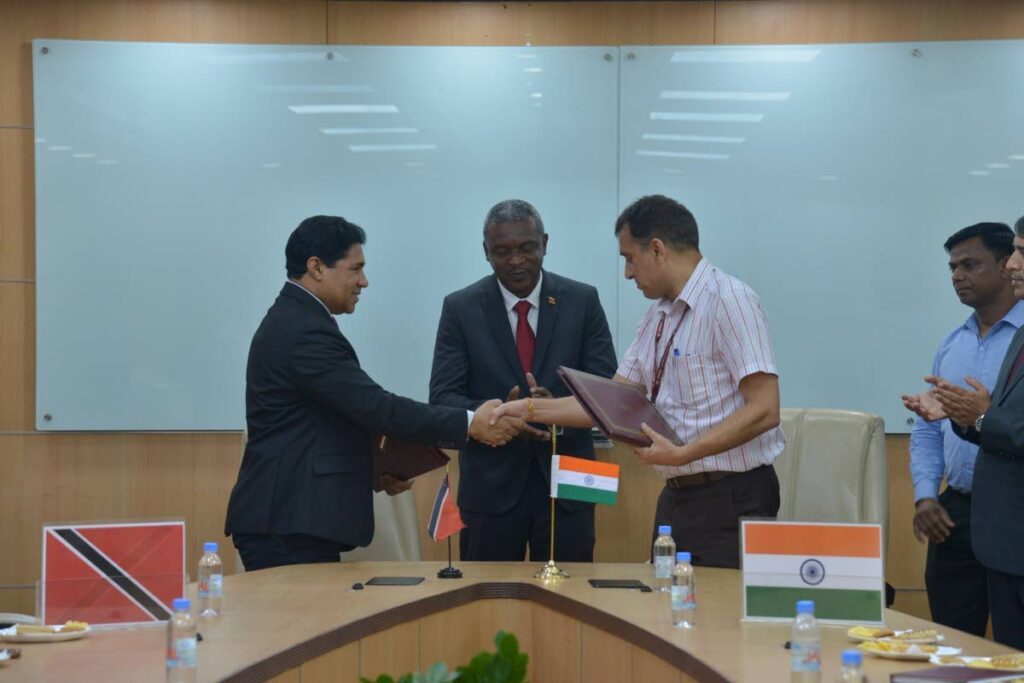Budget 2024: Digital transformation key priority

IN his 2024 budget presentation on Monday, Finance Minister Colm Imbert asserted that digital transformation remains one of the government's top priorities.
Describing it as a "critical sector," he thanked the Government of India for a memorandum of understanding (MoU) to advance digital transformation in TT, signed in August.
India's Ministry of Electronics and IT said it would help with capacity-building and training programmes, among other things.
"This collaboration will create a robust ecosystem of startups, developers and system integrators, driving next-generation innovation and enhancing inclusive finance," Imbert said.
In 2022, the UN Development Programme did a digital-readiness assessment for TT, which showed the country was at stage three of five, and classed as a country that is systematically applying digital tools and approaches.
Stage one is lacking the basic foundation for digital transformation, and stage two is advancing in select areas without co-ordinated strategy.
TT now has stage four (clear strengths in digital transformation and foundational elements in place) and stage five (advancing in all areas based on an integrated system) left to achieve.
So what’s next?
The 2024 Public Sector Investment Programme (PSIP), presented along with the budget, says the improvement of IT infrastructure in the public service will continue, with an allocation of $303.4 million "for the implementation of the government's digitisation programme."
It said for fiscal 2024, the ministry will focus on creating the digital government programme, a digital economy and a digital society.
The document says the ministry hopes to achieve several things, including a fully digital public service, e-identity for citizens, a financial system with fintech-enabled solutions and an e-commerce sector that adapts quickly to changes in the global market.
A fintech platform is set to be created, as well as enabling the online payment of taxes.
In addition, from January 2024-December 2025, there will be a cybersecurity investment tax allowance of up to $500,000 for companies that invest in cybersecurity software and network-security monitoring equipment.
In education, Finance Minister Colm Imbert said Wi-Fi access in schools will be expanded, and the e-book platform will continue "transforming teaching with more interactive, learner-centres approaches" and increasing the number of people using the e-testing system.
The Government will also continue distributing laptops to school students, announcing a further 2,400 fit-for-purpose laptops for students and selected staff at 94 secondary schools.
There are also plans for the continued digitisation of health records, postal services and police records, among other things.
Jayme Hoyte, senior vice president of business development at SmartTerm, told Business Day the 2024 budget showed “a commendable commitment to digital transformation…signalling a progressive leap into the digital age.

“The introduction of an online tax payment system is a significant stride towards convenience and efficiency, simplifying tax compliance for citizens and streamlining revenue collection for the government.”
She added that providing more laptops to students “highlights a clear dedication to bridging the digital divide, ensuring that students and professionals across the nation have access to the tools they need for education.”
On the MoU with India, she said it is A testament to the government’s “global perspective in fostering innovation and collaboration.
“These initiatives collectively underscore the government's forward-looking approach in harnessing technology to enhance public services, education, and economic development, ultimately positioning the nation for a brighter digital future."
She added, “I would really like to see digitisation focus be placed on smart agriculture for food security and prioritisation of our tourism product to make TT a future-forward top travel destination."
IT consultant Shivam Teelucksingh also praised the increase in laptop distribution, but warned that the devices must meet contemporary technological standards.
“Specifically, the government should focus on equipping students with laptops boasting ample RAM, fast and capacious storage, and powerful processors.
“As software demands evolve, outdated hardware could hinder students' academic progress and limit their ability to engage with modern applications, from educational software to web browsers.”
He also urged the government to generally ramp up on cybersecurity.

In addition, he called for clear regulations on fintech, and the investment in human capital, as he believes there is a shortage of skilled tech workers.
"The government should invest in education and training programmes, with a specific focus on equipping individuals with practical skills demanded by the industry."Internship programmes can bridge the gap between education and employment, providing hands-on experience for graduates and ensuring a steady pipeline of qualified professionals."
Johnny Tiu, one of the winners of the Digital Transformation Ministry’s D Hub Challenge, said he looks forward to “a unification and digitisation of all government services, reducing the friction that citizens experience in day-to-day life.”
Tiu submitted a proposal to the Environmental Management Authority for a mobile application which can be used to report noise pollution.

Line minister Hassel Bacchus believes the Digital Transformation Ministry can ensure efficacy, compliance and fitness of purpose as “we continue to forge ahead with the agenda.
“All ministries are now actively involved and actioning digital transformative initiatives.
“The ministry also continues the implementation of core functions and infrastructure that are also key components to ensure sustainability as we continue the journey.”


Comments
"Budget 2024: Digital transformation key priority"